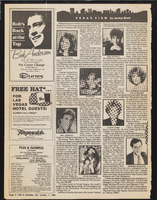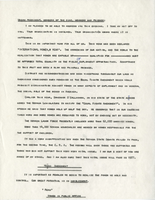Search the Special Collections and Archives Portal
Search Results
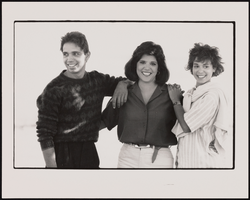
Siblings David Carrero, Doris Rodriguez, and Yvette Carrero stand together (identified from left to right): photographic print
Date
Archival Collection
Description
In 1981, Doris Rodriguez (center) moved to Las Vegas from Topeka, Kansas, with her husband and young son. In 1983, her younger sister, Yvette Carrero (right) and her boyfriend moved to Las Vegas from Lorain, Ohio. The next year, 1984, her brother David Carrero (left), his wife and young son also moved to Las Vegas. In 1985, Doris' sister, Elizabeth and her husband moved here with their two daughters from Lorain, Ohio. In the years since moving to Las Vegas, Doris gave birth to another son as did her brother's wife. Such interfamilial migration patterns and subsequent family expansions are responsible in large part for the impressive growth of Las Vegas, Nevada.
Image

Jaime Cruz interview, July 3, 2019: transcript
Date
Archival Collection
Description
Interviewed by Rodrigo Vazquez. Cruz was born in Lima, Peru to Carmen, who retired from CCSD as a teacher's aide, and Jaime, who was a professional soccer player. When young Jaime emigrated to the United States in 1987, it was to join his mother and brother in Las Vegas. The culture shock was significant, but he was undaunted. And, despite his engineering degree, the only employment he could secure was that of dishwasher. Cruz quickly understood the employment barriers that he would encounter and thankfully with the encouragement of mentors he improved his English skills and never omitted his degree from his resume. Eventually, it was noted and the decision to take a position that utilized this training would be one he never regretted. Today Cruz is the Executive Director of Workforce Connections, Southern Nevada's Local Workforce Development Board.
Text

Al McDaniels interview, February 28, 1980: transcript
Date
Archival Collection
Description
On February 28, 1980, Rodney Goosby interviewed Al McDaniels (b. 1940 in Muskogee, Oklahoma) about his life in Las Vegas and his career as an athletic coach. McDaniels, referred to as Coach by Goosby, speaks primarily about his time as a coach for track and field at the University of Nevada, Las Vegas, his community involvement and the city’s recreational activities. Moreover, McDaniels speaks about his education and his current research as he works on a doctoral degree in physical education. Lastly, he talks about the city’s growth and the move from empty desert spaces to housing and shopping center constructions.
Text
"Las Vegas Style" interview with Branscombe Richmond and Tom McGillen: video, 1996 October 06
Level of Description
Scope and Contents
Local news segment on an event for 500 Las Vegas residents who have lived here for over 30 years who are gathering for performances by entertainers who performed in Las Vegas in the 1940s and 1950s. Kay Starr arrives at Arizona Charlie's ahead of her performance, along with the Stardust Legends, showgirls and dancers who used to performance at the Stardust. Original media VHS, color, aspect ratio 4 x 3, frame size 720 x 486.
Archival Collection
Collection Name: Stardust Resort and Casino Records
Box/Folder: Digital File 00, Box 033
Archival Component
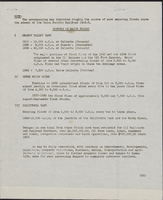
History of major floods in Moapa valley and adjacent washes, after 1945
Date
Archival Collection
Description
List of the major floods in the Moapa Valley with map to show locations of the floods.
Text
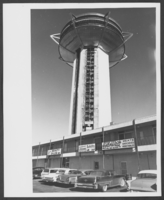
Photograph of construction on the Landmark Hotel tower, Las Vegas, Nevada, circa 1963
Date
Archival Collection
Description
The Landmark Hotel in Las Vegas, Nevada under construction. The Caroll Construction Company sign is visible. A strip mall is at the base of hotel with the Landmark Beauty Salon, Landmark Liquors, and Dial & Dine Landmarkett. Construction of the hotel took eight years, stalled by lack of funding.
Image

Transcript of interview with Harry Sax by Barbara Tabach, April 8, 2015
Date
Archival Collection
Description
Interview with Harry Sax by Barbara Tabach on April 8, 2015. In this interview, Sax discusses his family history and upbringing in Chicago, and his military service in Munich. He returned to Chicago and became business partners with Michael Schulson, with whom he opened several Arby's outposts, and expanded to Las Vegas in 1968. He talks about life in Las Vegas in the 1970s and the competition in the fast food industry. He then talks about the reform congregation in Chicago and his connection to Judaism throughout his life. He describes himself as a "closet Jew" before becoming president at Congregation Ner Tamid in 2007. Sax discusses the programs at Ner Tamid for all ages, and his continued involvement in the community.
In 1939, Harry Sax was born in Chicago, Illinois, the son to first generation American Jews. He spent his childhood on Chicago's South, where his family belonged to a progressive Reform congregation. After graduating from Hyde Park High School, he continued his education at Indiana University. In college, Harry was a member of the ZBT Jewish fraternity, participated in a singing group, and was a cadet in the Reserve Officers' Training Corps. Upon graduating from college, Harry was stationed in Munich, Germany as a second lieutenant in the Quartermasters Corps. In addition to his required military duties, he also participated in an after-hours acting group; through this group, he was hired as an extra and for small roles, including The Great Escape. When he finished his service, Harry returned to Chicago, where he connected with a high school friend, Mike Schulson. The two became partners and purchased Arby's franchises in Chicago and Las Vegas. Thus, in 1968, while his partner remained in Chicago, Harry moved to Las Vegas and opened two franchise locations in two weeks. Though it took a few years to stabilize the business and overcome competition, he opened a third location in 1972 on South Decatur, what was then the western edge of the city. Today, Harry has nineteen locations in Las Vegas, with additional franchises in Reno and Barstow, California, and employs nearly 300 people. After about twenty years as a "closet Jew" in the city, Harry reconnected with Judaism and joined Congregation Ner Tamid in the late 1990s. He served on its board, eventually becoming vice president and then president (2007-09). He also dedicated himself to have a bar mitzvah, following up on his Jewish education and confirmation as a teenager. Harry has also served on the Anti-Defamation League's board as well as an active member of the Chamber of Commerce.
Text


